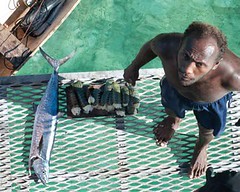37國的540位科學家共同做出結論,表示氣候變遷讓海洋以5千5百萬年來未見的高速酸化,唯一的緩解方法就是減少人類活動的碳排放。
這個結論是2012年9月加州蒙特里的第三屆「高濃度二氧化碳世界中的海洋」(Symposium on the Ocean in a High CO2 World)研討會成果。並由聯合國教科文組織下的跨政府海洋學委員會、海洋研究科學委員會、及國際地圈──生物圈計劃共同總結成報告,提交到2013年11月11至22日在華沙舉行的氣候變遷會議。
科學家預測,海洋生態系、海洋生物多樣性和珊瑚礁將出現「重大改變」,以致有影響糧食安全的可能。海草和部分浮游植物似乎能適應較高酸度的環境,但是珊瑚和甲殼類等其他生物很可能受到嚴重影響。如果二氧化碳排放量持續不減,貝類漁獲可能每年損失達1300億美元。

海洋吸收了人類活動排放的二氧化碳總量近四分之一,報告顯示,海洋每天吸收2400萬噸二氧化碳,自工業時代以來,酸性增加了26%。如果碳排放量持續不減,在西元2100年之前,全球海洋的酸度將會比工業時代之前還增加170%。隨著酸性增加,海洋會漸漸失去調節大氣中二氧化碳濃度及紓緩氣候變遷的能力。
科學家警告,就算從今天起完全停止二氧化碳排放,海洋仍會持續酸化數十年,影響海洋生態系統的穩定性。比起海水溫度上升、過度捕撈和污染等其他同樣存在的威脅,科學家更擔心海洋持續酸化的情形。
減少二氧化碳濃度,是降低長期大規模風險的唯一方法。若干相關因應措施也正在進行中,以減少知識落差、發展政策選項,並研發環境因素對整體生態系影響的檢視新方法。
2012年6月聯合國永續發展高峰會Rio+20宣布成立海洋酸化國際協調中心(Ocean Acidification International Coordination Centre),以摩納哥國際原子能機構的海洋環境實驗室為基礎,負責觀察、協調和推動海洋酸化研究,並將科學與政策相連結。全球海洋酸化觀察網絡(Global Ocean Acidification Observing Network)也在2012年6月成立,和國際協調中心合作,此網絡將測量化學和生態系變因並確保資料品質和可比較性,目標是為海洋酸化影響的即時評估提供比較基礎。
為期10年的全球永續性研究計畫「未來地球」將提供包含海洋酸化議題的跨國研究議程機制。「未來地球」由全球永續科技聯盟贊助,聯盟成員包含聯合國教科文組織、國際科學理事會、國際社會科學理事會、聯合國環境規劃署和聯合國大學。部分上述組織也贊助了「國際海洋碳協調計畫」(International Ocean Carbon Coordination Project),監控和研究碳排放量增加對海洋的影響,以及海洋酸化對生物鈣化和珊瑚成長率的影響。
Climate change is causing the world’s oceans to acidify at rates not seen for the last 55 million years, and the only way to moderate this danger is to reduce human emissions of carbon dioxide, conclude 540 scientists from 37 countries in a new report.
Their conclusion is the outcome of the Third Symposium on the Ocean in a High CO2 World that took place in Monterey, California in September 2012. The findings of these experts were presented in a report to the Conference on Climate Change that took place in Warsaw from November 11 to 22.
The report was prepared by UNESCO’s Intergovernmental Oceanographic Commission, the Scientific Committee on Ocean Research and the International Geosphere-Biosphere Programme.
The scientists expect “substantial changes” in marine ecosystems, marine biodiversity and coral reefs that have the potential to affect food security.
They warn that seashell fisheries could lose some US$130 billion annually, if current CO2 emissions remain unchanged.
It emerges that all the oceans, which together absorb close to one quarter of the CO2 emissions generated by human activity, have experienced an overall 26 percent rise in acidity since the dawn of the industrial age.
Twenty-four million tonnes of CO2 are absorbed by the oceans every day and, if current emission rates are maintained, the level of the ocean acidity worldwide will rise by 170 percent before 2100, compared to the pre-industrial age.
As acidity increases, the oceans are losing their ability to process atmospheric CO2 emissions and to mitigate climate change.
Even if all carbon emissions were stopped today the acidification would continue for decades, jeopardizing the stability of marine ecosystems, the scientists warn.
They say that this ongoing acidification is all the more worrying in view of other threats to marine ecosystems such as rising water temperatures, overfishing and pollution.
While sea grass and some phytoplankton species seem able to cope with higher acidity, other organisms, such as corals and crustaceans are likely to be severely affected. Reducing CO2 levels is the only way to minimize long-term, large-scale risks.
Several initiatives are underway to address the knowledge gap, foster new methods to examine the full ecosystem response to all these environmental factors and develop policy options.
The creation of the Ocean Acidification International Coordination Centre was announced in June 2012 at the UN’s Rio+20 summit. Based at the International Atomic Energy Agency’s Marine Environmental Laboratories in Monaco, this facility will communicate and promote international activities in ocean acidification research and observation and link science with policy.
A Global Ocean Acidification Observing Network also was established in June 2012. Working with the new International Coordination Centre, the network will measure chemical and ecosystem variables and ensure data quality and comparability. The goal is to provide a baseline for the timely assessment of ocean acidification impacts.
Future Earth, a new 10-year international research initiative on global sustainability, will provide a mechanism for developing an internationally coordinated research agenda that will include issues like ocean acidification.
Future Earth is sponsored by the Science and Technology Alliance for Global Sustainability. This alliance includes UNESCO, the International Council for Science, the International Social Science Council, the UN Environment Programm and the United Nations University.
Some of the same organizations sponsor the International Ocean Carbon Coordination Project, a monitoring and research program that focuses on the effect of increasing level CO2 emissions on oceans. These scientists study the effect of ocean acidification on calcifying organisms and coral growth rates.








